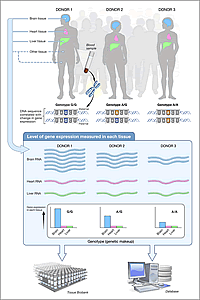Last updated: July 17, 2012
NIH launches Genotype-Tissue Expression project

National Human Genome Research Institute
www.genome.gov
NIH launches Genotype-Tissue Expression project
Project to chart influence of DNA changes on gene function in human tissues and organs
Each cell in the human body contains a complete set of genes, yet not every gene is turned on, or expressed, in every cell in the body. To function properly, each type of cell turns different genes on and off, depending on what the cell does. For example, some genes that are turned on in a liver cell will be turned off in a heart cell.
In addition, recent genome-wide association studies have identified several hundred common genetic variants — inherited changes in the DNA sequence of the human genome — that play a role in an individual's susceptibility to complex human illnesses such as heart disease, mental illnesses, cancer and diabetes.
GTEx seeks to combine these two observations to generate data to study systematically how gene expression is regulated in different organs in the human body. This would be a key step to explain the underlying biology of many organ-specific diseases.
GTEx launches as a two-year pilot study supported by the NIH Common Fund.
Researchers will use GTEx data to follow up on findings from genome-wide association studies and as a resource for the general study of gene expression networks.
For instance, a researcher interested in cardiovascular disease could access GTEx data to view all the genetic variants in the human genome that affect gene expression in the heart. For particularly promising genes whose expression is correlated with a disease-associated genetic variant, functional studies in model organisms - such as mouse models of the disease - could then be targeted to further explore the mechanism by which genetic variants increase the risks of illness.
"GTEx will begin to provide researchers with a comprehensive view of genetic variation and a more precise understanding of how it affects genes critical to the normal function of tissues and organs," said NIH Director Francis S. Collins, M.D., Ph.D. "This resource will add a new dimension to our understanding of human biology and the mechanisms that lead to disease."
GTEx's initial phase will test the feasibility of collecting high-quality ribonucleic acid (RNA) from 30 to 50 tissue sites in the body, including the brain, lung, heart and muscle. A particular form of RNA, called messenger RNA, is a direct measure of gene expression.
Samples will come from approximately 160 deceased donors identified through autopsy or organ and tissue transplant programs. In addition, a small subset of normal tissues will be collected from living surgery patients as a comparison group. Extensive clinical and medical information for all GTEx donors will also be collected.
The DNA from each donor will be genotyped, a process that catalogs genetic variants across an individual's genome. Then, using 'next-generation sequencing' technologies, the RNA in each individual's tissues will be sequenced using a new technique that accurately and comprehensively measures the level of gene expression.
"This kind of study is now possible because of recent advances in DNA sequencing technologies and analytical tools" said National Human Genome Research Institute (NHGRI) Director Eric D. Green, M.D., Ph.D., who is co-chair of the GTEx project. "GTEx will allow us to gain unprecedented insights into the influence of genetic variation on human health."
The GTEx pilot project comprises three biospecimen source sites, and a laboratory data analysis and coordinating center. Led by the National Cancer Institute's cancer Human Biobank (caHUB) initiative, http://cahub.cancer.gov, the biospecimen source sites will recruit donors and collect the tissues.
Each biospecimen source site will ship the specimens, except the brain and spinal cords, to caHUB. A portion of each specimen will be sent to the laboratory, data analysis and coordinating center for molecular analysis. The biospecimen source sites, principal investigators and approximate funding levels are:
National Disease Research Interchange, Philadelphia
John Lonsdale, Ph.D., and Jeffrey Thomas
$3.5 millionRoswell Park Cancer Institute, Buffalo, N.Y.
Barbara Foster, Ph.D.
$2 millionScience Care, Inc., Phoenix, Ariz.
Harold Magazine, Ph.D. and Mark Kartub, M.D.
$750,000
The brains and spinal cords will be sent to the Brain Endowment Bank at the University of Miami, overseen by principal investigator Deborah Mash, Ph.D. The bank has received a three-year supplement award of $362,000 to isolate cells from regions of the brain that will be sent to the GTEx laboratory, data analysis and coordinating center. The remaining brain and spinal cord tissue will be banked and made available for future NIH-sponsored studies of the central nervous system.
The National Disease Research Interchange will also collaborate with Laura A. Siminoff, Ph.D., Virginia Commonwealth University, Richmond, who has received approximately $283,000 to conduct a study of the ethical, legal and social issues related to donor recruitment and consent.
The laboratory, data analysis and coordinating center will be responsible for the overall coordination of GTEx activities and will serve as the molecular and statistical analysis laboratory. Co-principal investigators and approximate funding level are:
Broad Institute, Inc., Cambridge, Mass.
Wendy Winckler, Ph.D. and Kristin Ardlie, Ph.D.
$11.4 million
Another component of the GTEx pilot project will foster the development of improved statistical methods to analyze data generated by the project. The principal investigators who will develop these tools and approximate funding levels are:
Nancy J. Cox, Ph.D. and Dan L. Nicolae, Ph.D., University of Chicago
Using the Transcriptome for Single Nucleotide Polymorphisms and Gene Annotation
$642,000 (2 years)Emmanouil Dermitzakis, Ph.D., Roderic Guigo, Ph.D., Daphne Koller, Ph.D. and Mark I. McCarthy, M.D., University of Geneva, Switzerland
Methods for High-Resolution Analysis of Genetic Effects on Gene Expression
$659,000 (2 years)Jun S. Liu, Ph.D., Harvard University, Cambridge, Mass.
Epistatic and Cross Tissue Analysis for Human Gene Expression Traits
$594,000 (2 years)Jonathan K. Pritchard, Ph.D., University of Chicago
Statistical Analysis of Gene eQTLs
$676,000 (2 years)Ivan Rusyn, M.D., Ph.D., Andrew B. Nobel, Ph.D. and Fred A. Wright, Ph.D., University of North Carolina at Chapel Hill
Facilitating GTEx, disease and Gene-Environment Analyses via Fast Expression eQTL
$659,000 (2 years)
"The development of robust statistical tools that can maximize the usefulness of the unique data that GTEx will generate is important to understanding the contribution of genetic variation to human health and disease," said National Institute of Mental Health Director (NIMH) Thomas R. Insel, M.D., co-chair of the GTEx project.
A GTEx database will be developed by the National Center for Biotechnology Information (NCBI), part of the NIH's National Library of Medicine. The database will allow users to view and download computed GTEx results and provide a controlled access system for de-identified individual-level genotype, expression, and clinical data through NCBI's database of Genotypes and Phenotypes (dbGaP) at http://www.ncbi.nlm.nih.gov/gap. Other genome browsers will also be supported to integrate and display GTEx data.
An external scientific panel has been established to provide input to the GTEx project. Members, who have been appointed for the length of the pilot project, are: Eric Schadt, Ph.D. (Chair), chief scientific officer, Pacific Biosciences, Menlo Park, Calif.; Kevin K. Brown, M.D., professor and vice chairman, Department of Medicine, National Jewish Health, Denver; Vivian G. Cheung, M.D., professor, pediatrics and genetics, University of Pennsylvania School of Medicine and Howard Hughes Medical Institute, Philadelphia; Ross Hardison, Ph.D., professor of biochemistry and molecular biology, The Pennsylvania State University, University Park; Allan Jones, Ph.D., chief executive officer, Allen Institute for Brain Science, Seattle; Rebecca Pentz, Ph.D., professor of research ethics, Department of Hematology & Medical Oncology, Emory University School of Medicine, Atlanta; David L. Rimm, M.D., Ph.D., professor of pathology, Yale University School of Medicine, New Haven, Conn.
For more information about the GTEx project, visit http://commonfund.nih.gov/GTEx/.
The Genotype-Tissue Expression project is funded through the Common Fund, and managed by the NIH Office of the Director in partnership with the National Human Genome Research Institute, National Institute of Mental Health, the National Cancer Institute, the National Center for Biotechnology Information at the National Library of Medicine, the National Heart, Lung and Blood Institute, the National Institute on Drug Abuse, and the National Institute of Neurological Diseases and Stroke, all part of NIH. The NIH Common Fund encourages collaboration and supports a series of exceptionally high impact, trans-NIH programs. Common Fund programs are designed to pursue major opportunities and gaps in biomedical research that no single NIH Institute could tackle alone, but that the agency as a whole can address to make the biggest impact possible on the progress of medical research. Additional information about the NIH Common Fund can be found at http://commonfund.nih.gov.
NHGRI is one of the 27 institutes and centers at the National Institutes of Health, which is an agency of the Department of Health and Human Services. The NHGRI Division of Extramural Research supports grants for research and for training and career development at sites nationwide. Additional information about NHGRI can be found at www.genome.gov.
The mission of the NIMH is to transform the understanding and treatment of mental illnesses through basic and clinical research, paving the way for prevention, recovery and cure. For more information, visit the NIMH website.
NCI leads the National Cancer Program and the NIH effort to dramatically reduce the burden of cancer and improve the lives of cancer patients and their families, through research into prevention and cancer biology, the development of new interventions, and the training and mentoring of new researchers. For more information about cancer, please visit the NCI website at www.cancer.gov or call NCI's Cancer Information Service at 1-800-4-CANCER (1-800-422-6237).
Part of the National Institutes of Health, the National Heart, Lung, and Blood Institute (NHLBI) plans, conducts, and supports research related to the causes, prevention, diagnosis, and treatment of heart, blood vessel, lung, and blood diseases, and sleep disorders. The Institute also administers national health education campaigns on women and heart disease, healthy weight for children, and other topics. NHLBI press releases, information on NHLBI's role in the American Recovery and Reinvestment Act, and other materials are available online at www.nhlbi.nih.gov.
NCBI creates public databases in molecular biology, conducts research in computational biology, develops software tools for analyzing molecular and genomic data, and disseminates biomedical information, all for the better understanding of processes affecting human health and disease. NCBI (www.ncbi.nlm.nih.gov) is a division of the National Library of Medicine (www.nlm.nih.gov), the world's largest library of the health sciences.
NIDA supports most of the world's research on the health aspects of drug abuse and addiction. The Institute carries out a large variety of programs to inform policy and improve practice. Fact sheets on the health effects of drugs of abuse and information on NIDA research and other activities can be found on the NIDA home page at www.drugabuse.gov.
NINDS, a component of the National Institutes of Health (NIH) within the U.S. Department of Health and Human Services, is the nation's primary supporter of basic, translational, and clinical research on the brain and nervous system. NINDS aims to reduce the burden of neurological disease among all Americans. Go to www.ninds.nih.gov for more information.
The National Institutes of Health (NIH) -"The Nation's Medical Research Agency" - includes 27 Institutes and Centers and is a component of the U. S. Department of Health and Human Services. It is the primary federal agency for conducting and supporting basic, clinical and translational medical research, and it investigates the causes, treatments and cures for both common and rare diseases. For more information about NIH and its programs, visit www.nih.gov.
Contact
Geoffrey Spencer, NHGRI
(301) 402-0911
Jules Asher, NIMH
(301) 443-4536
NIMHPress@nih.gov
NIH Office of Communications
(301) 496-4461

